With room for seven, we review the Toyota Prius +
ROAD TEST REPORT AND REVIEW: Toyota Prius + T Spirit 1.8 CVT
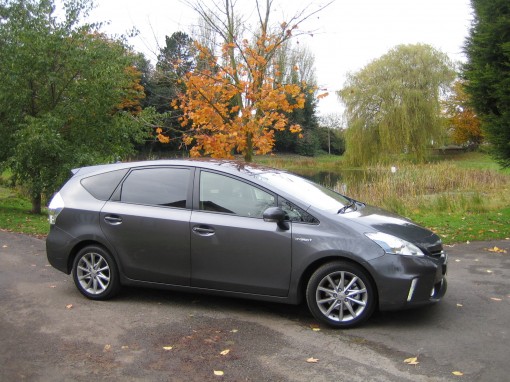
Toyota now offers a larger seven-seat version of its hybrid Prius, DAVID HOOPER has a look at its Plus points?
THE Toyota Prius was the first hybrid car to appear in our showrooms, incredibly it went on sale way back in 1997 in Japan, before coming to Europe in 2000. How time flies!
Wary of the technology, it took a while for the buying public to catch on, but after a slow start the Prius grew in popularity and today around 100,000 of them are sold around the world every month, with 300-400 cars being sold in UK every month. Around 2,000 Prius+ models are expected to find new homes in the UK every year.
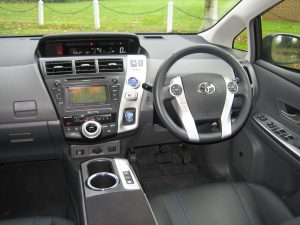 A larger, more practical version of the car, the Toyota Prius + joined the range in July, extending the appeal of the hybrid car still further, so what are its “plus” points.
A larger, more practical version of the car, the Toyota Prius + joined the range in July, extending the appeal of the hybrid car still further, so what are its “plus” points.
The main differences are space and two extra seats, thanks to a body which is 135mm longer, 85mm higher and 30mm wider, giving the car an estate, or MPV profile.
This extra space has created enough room for two extra seats in the back of the Prius, which fold neatly into the floor when they are not required. Ideally suited to children, adults would struggle to sit comfortably for any distance, mainly because of the limited leg room, but there is plenty of room for them in the three individual seats which make up the middle row, and of course, the two up front, which are divided by a large central console.
If the two rear-most seats aren’t required, there’s an extra 339 litres of space over the standard Toyota Prius, or put another way, 76% more space.
To accommodate all this extra space and versatility, the wheelbase has been extended by 8cm, and the car is firmly sprung to cope with the potential of up to seven passengers. The ride and handling is perfectly acceptable for a car of this sort, and its performance figures, with a 0-62mph time of 11.3 seconds, are pretty much what you’d expect.
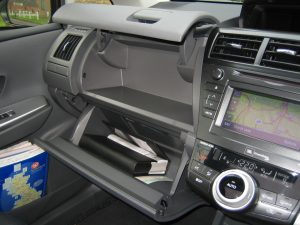 The official fuel consumption figures, I believe, are on the optimistic side and are hard to achieve in real world driving conditions. The official combined figure is 67.3mpg which would be impressive, but during my test, the Prius + returned 46.5mpg on a motorway trip of 200 miles, and an overall average of 47.8mpg during what I would consider to be an average week’s family motoring. Any conventional diesel worth its salt could easily match these figures, without the expense and complicated technology involved with hybrid cars.
The official fuel consumption figures, I believe, are on the optimistic side and are hard to achieve in real world driving conditions. The official combined figure is 67.3mpg which would be impressive, but during my test, the Prius + returned 46.5mpg on a motorway trip of 200 miles, and an overall average of 47.8mpg during what I would consider to be an average week’s family motoring. Any conventional diesel worth its salt could easily match these figures, without the expense and complicated technology involved with hybrid cars.
There are benefits of running a Prius though, especially if you’re a company car driver thanks to lower than usual 10 per cent BIK rating. You also pay little road tax, thanks to its 101g/km C02 figure, and none at all if you go for the lower spec T4 model, the only other model in the Prius + range, thanks to its 96g/km C02 figure, which gives it the notoriety of becoming the first MPV to duck below the 100g/km barrier. There is no road tax to pay on this particular model in the first year and then only £10 per year road tax after that.
If you venture into the Capital, Boris won’t sting you for his Congestion Charge either, so in some ways, a hybrid makes sense, but what is like to live with?
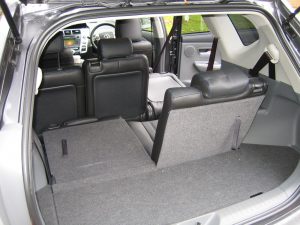 For a start, as with other Prius models, it is self-contained, meaning that you don’t have to plug it into your house to recharge it, although now there is a version of the car with which you do just that. So, with the Prius + there are no worries about running out of battery power. The battery is recharged as you drive and when it gets low on power, the petrol engine takes over seamlessly.
For a start, as with other Prius models, it is self-contained, meaning that you don’t have to plug it into your house to recharge it, although now there is a version of the car with which you do just that. So, with the Prius + there are no worries about running out of battery power. The battery is recharged as you drive and when it gets low on power, the petrol engine takes over seamlessly.
It’s as easy to drive as any automatic – you simply select “D” for Drive and off you go. The car will operate as an electric vehicle as much as it can – something which saved me quite a bit of fuel in a huge motorway traffic jam, but is equally relevant in urban queues.
If the battery’s charge drops too much, the engine will cut in to drive the car without any intervention from the driver.
It cruises quietly enough once up to speed on the motorway, but I really didn’t like the CVT gearbox, which works on a system of expanding belts, but sounds like the clutch is slipping as the engine revs loudly until the belts expand enough to take up the drive. It really was an unpleasant racket which became quite annoying and surely can’t help the fuel economy with the engine revving away so much. Around town, it was much less noticeable.
In this top-spec model, equipment levels are good, with all the mod cons like Bluetooth, a good sat nav system and a colour reversing camera, which is always useful if you have a car full of people and can’t see out of the back very well.
There is also a graphic which shows whether the engine, the electric motor, or both are driving the front wheels, or whether the wheels are recharging the battery as the car slows down, coasts up to a junction, or brakes.
That is something I never tire of and is absolutely fascinating to watch!
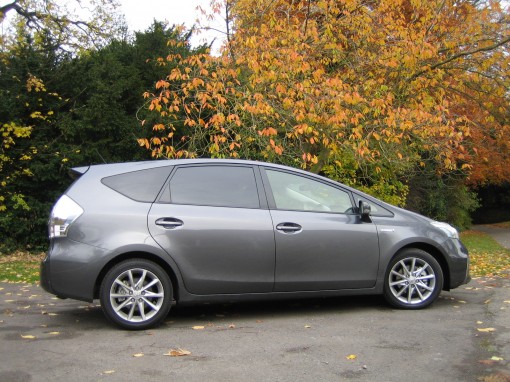
CLICK HERE and “Like” our Facebook page for regular updates and follow us on
Twitter
Rating: 

















THE VITAL STATISTICS
MODEL: Toyota Prius + T Spirit 1.8 CVT
TOYOTA PRIUS RANGE: From T3 Hybrid 1.8 VVT-i 5dr (£21,845) to Plug-in Hybrid 5dr (£33,245).
ENGINE: 1.8-litre (98bhp) petrol engine and 81bhp (60KW) electric motor, driving front wheels through a CVT gearbox.
PERFORMANCE: Top speed 103mph. 0-62mph in 11.3 secs.
ECONOMY: City: 68.9mpg.
Country: 74.3mpg.
Combined: 67.3mpg.
Fuel tank: 45 litres.
CO2 EMISSIONS: 101g/km.
INSURANCE: Group 12.
PRICE: £29,945.
WARRANTY: 5 years/100,000 miles.
WEBSITE: www.toyota.co.uk
• All data correct at time of publication.
